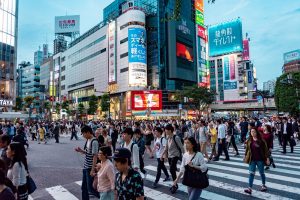Japan’s economy has officially entered a recession — defined as two consecutive quarters of negative economic growth — according to new economic data released Monday. According to the Japanese Cabinet Office, seasonally adjusted real gross domestic product contracted by 3.4 percent for the period between January and March 2020. The figure was short of median expectations of a 4.6 percent contraction. The data captured the early effects of the COVID-19 pandemic slowdown — particularly the effects of China’s early lockdowns in January and February.
Digging deeper, the new Japanese data showed that all major indicators of overall economic health had taken a hit, with production, exports, and consumer spending all down for the first quarter of the year. Given that Tokyo’s own response to the pandemic intensified largely after the period for which data is available, we should expect a worsening picture through the second quarter.
The world’s third largest economy may see a contraction of more than 20 percent, according to some analysts, a figure that would set a record for the country going back to 1955, the first year for which official economic data is available. Given Japanese Prime Minister Shinzo Abe’s announcement of a state of emergency in April, too, demand in Japan is expected to be significantly depressed through the second quarter.
The new recession is the first for Japan in four-and-a-half years and is expected to exact a heavy cost on Japanese businesses and consumers. Japan was last in a recession in late 2015.
The Japanese government has taken steps to stem the economic damage of the ongoing pandemic-induced economic crisis. Recently, Japanese lawmakers passed an additional budget. Abe has called for a second emergency spending bill to be pushed through to protect Japanese small businesses; the second budget may cover business rents and payroll costs. Already, Japan has spent more than 20 percent of GDP on pandemic-response measures.
Parts of Japan have exited the state of emergency imposed last month, but the country’s major urban hubs continue to be under lockdown (though Japan’s version of a lockdown is less stringent than those seen in some other countries). The higher population density and reliance on public transportation may increase the probability of a rapid surge in cases. Despite domestic and international criticism of the Japanese government’s pandemic response, the country has not seen a major surge in cases, with a fatality rate of around five people per million attributable to COVID-19.
As of Monday, 4.7 million people worldwide had contracted COVID-19, the disease caused by the SARS-CoV-2 virus, and 315,000 people had died. Japan had more than 16,200 confirmed cases as of Monday.

































